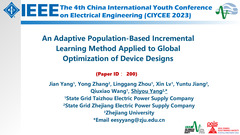An Adaptive Population-Based Incremental Learning Method Applied to Global Optimization of Device Designs
ID:105
Submission ID:200 View Protection:ATTENDEE
Updated Time:2023-11-29 16:06:58
Hits:791
Oral Presentation
Abstract
In a traditional evolutionary algorithm, the selection, crossover, and mutation are commonly used to evolve its searching procedure. For a robust and feasible evolutionary algorithm, these operators must be properly designed. Nevertheless, the proper design of these operators is not an easy task. On the other hand, it would be preferable for an algorithm that the previously explored solutions can be used to help the creation of new solutions or states. In this point of view, evolutionary methods using probabilistic models are deserved further attentions. The Population-Based Incremental Learning (PBIL) algorithm can be categorized into this type of algorithms. The PBIL is initially developed as a binary coded algorithm, and is awkward to some extent in applying to solve a design problem with continuous variables. In this respect, an adaptive continuous PBIL is introduced. In the newly improved PBIL method, an automatic mechanism is presented to update the probability matrix, which is adopted to stochastically produce the offspring, to obtain a balance among the fast convergence and the high quality final solution. Two examples are numerically solved by the introduced PBIL method to highlight its advantages and deficiencies.
Keywords
Adaptive updating, evolutionary algorithm, inverse problem, population based incremental learning (PBIL).
Submission Author
Jian Yang
State Grid Taizhou Electric Power Supply Company, Taizhou, 318000, China.
Yong Zhang
State Grid Zhejiang Electric Power Supply Company, Hangzhou, 310007, China.
Shiyou Yang
Zhejiang University




Comment submit